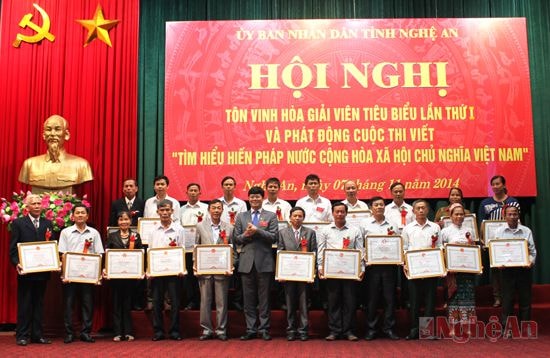Overcoming difficulties, actively contributing to promoting socio-economic development of the province
(Baonghean) - On August 28, 1945, the Provisional Government of the Democratic Republic of Vietnam issued a Proclamation announcing the list of the National Unification Cabinet with 13 Ministers, chaired by President Ho Chi Minh, including Minister of Justice Vu Trong Khanh. The Judiciary of the new regime was born from that time and according to Decision No. 715/TTg, dated November 7, 1995 of the Prime Minister, every year August 28 is taken as "Traditional Day of the Judiciary".
During the 70 years of striving, building and growing, the Judicial sector has continuously developed, overcome all difficulties and challenges, strived to rise up, excellently completed the assigned tasks in the revolutionary stages and made great and important contributions to the victory of the cause of building and defending the Socialist Republic of Vietnam. Inheriting and promoting those achievements and traditions, the Judicial sector of Nghe Tinh (now Nghe An) has been increasingly consolidated and strengthened in terms of organization, quantity and quality of staff; discipline, order, serving the cause of innovation, industrialization and modernization of the country according to the policies of the Party and State.
 |
| Justice Department officials guide citizens through household registration procedures. Photo: PV |
Since 1972, according to Decree No. 190/CP of the Government, along with the establishment of a system of legal agencies nationwide, the Legal Department of the Nghe An Provincial Administrative Committee was established. By 1981, the Department of Justice and the judicial agencies of Nghe Tinh province were established and built into a system according to Decree 143-HDBT dated November 22, 1981 of the Council of Ministers (now the Government). After the separation of Nghe Tinh into two provinces of Nghe An and Ha Tinh (in 1991), along with the birth of the 1992 Constitution and the policy of perfecting and strengthening the organization and operation of the Judicial sector, paying special attention to the construction and consolidation of local Judicial agencies from the province to the grassroots level and implementing Directive 266/TTg of the Prime Minister on receiving the work of Civil Judgment Enforcement transferred from the People's Court, the People's Committee of Nghe An province issued a Decision to re-establish all the Judicial Departments under the People's Committees at the district level to help the People's Committees at all levels manage the State on the work of Civil Judgment Enforcement.
 |
| Awarding Certificates of Merit to individuals and groups at the 2014 Mediator Conference. |
Next, in response to the requirements of administrative reform, judicial reform, and the building of a socialist rule-of-law state in Vietnam, in line with the trend of regional and international integration, the Government issued Decree No. 171/2004/ND-CP and Decree No. 172/2004/ND-CP dated September 29, 2004. The Provincial People's Committee issued Decision No. 05/2005/QD.UB and Decision No. 06/2005/QD.UB dated January 11, 2005 on the organization of specialized agencies under the Provincial People's Committee and the People's Committees of districts, cities, and towns, including the Department of Justice and the Department of Justice. Accordingly, the Department of Justice was improved and its organization and staff were consolidated; the District-level Departments of Justice were re-established and strengthened; specialized Justice - Civil Status officers at the commune level were arranged to stabilize and standardize, and the quality of the officers was increasingly higher.
From 2010 to present, implementing Resolution No. 49-NQ/TW dated June 2, 2005 of the Politburo on judicial reform strategy to 2020 with the consistent goal of building a clean, strong, democratic, strict, justice-protecting, gradually modernized judiciary serving the people and the socialist Fatherland of Vietnam. Based on the assigned functions and tasks, in order to ensure order and cohesion in work, and to make the judicial work operate effectively, on December 22, 2014, the Ministry of Justice and the Ministry of Home Affairs issued Joint Circular No. 23/2014/TTLT-BTP-BNV guiding the functions, tasks, powers and organizational structure of the Department of Justice under the People's Committee of the province, centrally-run city and the Justice Department under the People's Committee of the district, town, city under the province, replacing Joint Circular No. 01/2009/TTLT-BTP-BNV dated April 28, 2009. Accordingly, the Nghe An Department of Justice was consolidated and improved with 8 specialized departments and 4 affiliated public service units, the total number of staff, civil servants and public employees of the current department is 86 people, of which: the number of staff with postgraduate qualifications: 5 comrades, accounting for 5.8%; The number of cadres with university degrees is 82 comrades, accounting for 95.3%; the number of cadres with bachelor's degrees, advanced political theory is 7 comrades, accounting for 8.1%; the number of cadres with intermediate political theory degrees is 1 comrade, accounting for 1.16%; the number of cadres with advanced state management degrees is 1 comrade, accounting for 1.16%; and the number of main specialists is 7 comrades, accounting for 8.1%.
The Justice Departments of districts, cities, towns and the Justice - Civil status officers at the commune level have been strengthened to ensure both quantity and quality to carry out the assigned tasks. Currently, in the whole province, there are 17 districts, 1 city, 3 towns corresponding to 21 Justice Departments, with 86 officers and civil servants all with university and post-graduate degrees. The total number of Justice - Civil status officers at the commune level is 770 people/480 communes. Thus far, almost every commune, ward and town has arranged 2 Justice - Civil Status officers, Justice - Civil Status officers and is gradually being standardized in terms of training level, through forms of examination or attracting good and excellent university graduates to work according to the province's policy (currently the number of people with university degrees is 383 people, accounting for 49.7%), most of the Justice - Civil Status officers at the commune level have been trained in professional expertise and judicial work at the grassroots level.
Along with strengthening the organization and construction of the sector, many aspects of work have gone into depth, have been systematic and of high quality, contributing to the good implementation of the local political tasks. The work of drafting and checking legal documents has well performed the tasks assigned by the Ministry of Justice, the National Assembly delegation, the Standing Committee of the People's Council and the Provincial People's Committee in participating in giving comments on draft laws and sub-law documents. The work of reviewing legal documents is conducted by the Department of Justice in coordination with the Provincial People's Committee Office and other sectors annually or by topic or field. At the district and commune levels, the Program for drafting legal documents has been issued and active coordination with relevant departments and offices has been carried out in drafting and appraising draft legal documents, contributing to improving the effectiveness and efficiency of state management of the same-level government. The work of propagating, disseminating and educating the law has been regularly led and directed by Party and State agencies and political organizations from the central to local levels, and has had positive changes. With the responsibility of being the Standing Agency of the Council, the Department of Justice, the Justice Department and the Commune-level Justice Department have played a good advisory role in developing and organizing the implementation of annual programs and plans for disseminating and educating the law.
The work of monitoring the implementation of the law, managing the implementation of the law on handling administrative violations and controlling administrative procedures are new tasks but have gradually become routine and operate effectively. Judicial administration and management of judicial support organizations are identified as a key task, so in recent years, areas such as household registration and management from the provincial to district and commune levels have been well implemented, in accordance with the provisions of law. The activities of judicial support organizations (Judicial appraisal, Lawyers, Notaries, Property Auction, Bailiffs, etc.) ensure practical effectiveness, creating favorable conditions and bringing direct benefits to the people. Currently, in the whole province, there are 3 public judicial appraisal organizations and 7 case-based appraisal organizations, 29 law practice organizations, 8 professional auction organizations (of which 1 auction organization is a public service unit under the Department of Justice), 30 notary practice organizations (of which 2 practice organizations are public service units under the Department of Justice), 2 legal consultancy offices, 2 bailiff organizations. The free legal aid activities for the poor and policy beneficiaries have been implemented since 1997 according to Decision No. 734/TTg dated September 6, 1997 of the Prime Minister, which has really contributed to raising the understanding and awareness of law compliance for the people, especially in rural communes, remote areas, etc. The work of inspection, examination and settlement of complaints and denunciations has received special attention and has been well implemented by the sector under the leadership and direction of the Party Committee, People's Committee and guidance of the Ministry of Justice.
The achievements and results in the organization and operation of the Judicial sector of Nghe An province in recent years have been recognized by the Party and the State. Many collectives and individuals in the whole sector have been awarded many high titles such as: The Government's rotating flag, Second-class Labor Medal, Third-class Labor Medal and many other noble awards. With the goal of "Consensus, overcoming difficulties, competing to excellently complete assigned political tasks" to promote the achievements, cadres, civil servants, public employees and workers of the Judicial sector of Nghe An province continue to strive to excellently complete their tasks, contributing to promoting economic development, maintaining political stability and social order and security in the province.
Hoang Quoc Hao
Director of Nghe An Department of Justice






